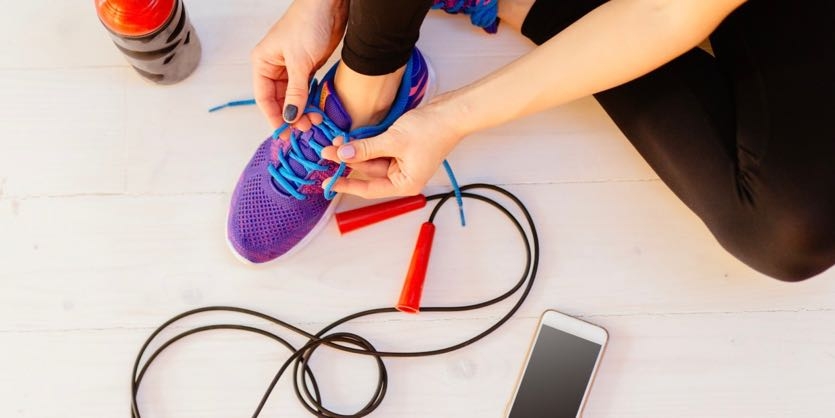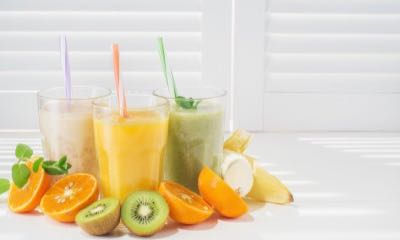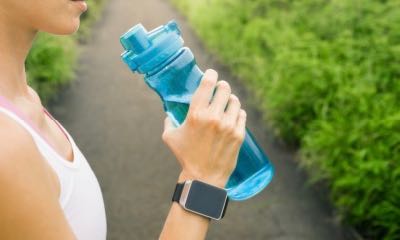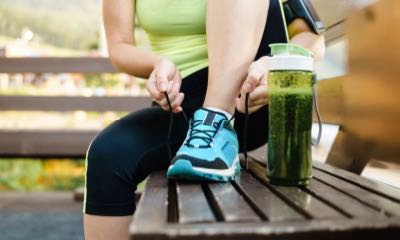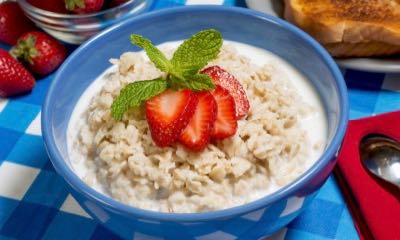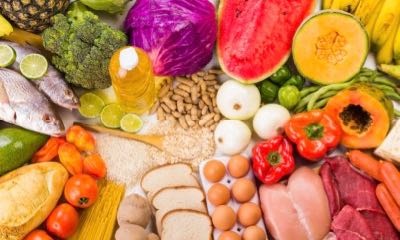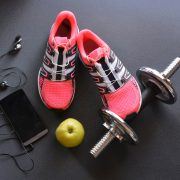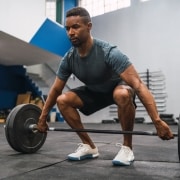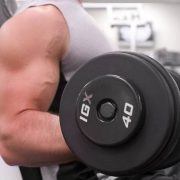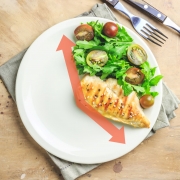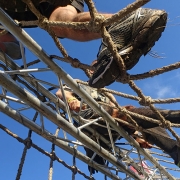Fuel Your Fitness with the Best Pre-Workout Foods
You change into your workout clothes, get your equipment ready, and start your workout. And within a few minutes you’re already feeling tired, worn out, and not ready for what you have planned. It feels like you’re wasting your time. You want to do better, but today you just don’t have the motivation—and fuel—to push through.
Everybody has had a bad workout before. It happens. But when it comes time to exercise, you want to minimize the obstacles that keep you from performing your very best. They can be caused by stress, mental or physical fatigue, poor nutrition, or a number of different things. Some of these factors can be outside of your power, but nutrition is one you can control.
All of your food choices during the day play an important role in making sure you have the nutrients you need. But your pre-workout foods can have the biggest influence on how you perform while exercising. See which nutrients and foods to choose before exercise.
Where to Look For Energy
Providing energy should be the first thing that comes to mind when you think about pre-workout foods. Exercising while fasting can play a role in weight loss, but is not going to lead to your best performance. What you read below is all about performing your best, and eating before your workout is essential to that.
To decide what your energy needs will be, you first need to know what type of workout you are going to have. A low-intensity, 20-minute workout has very different needs than a higher-intensity workout lasting over an hour.
Your goal should be to consume enough calories to match your planned workout. (If you will be exercising more than an hour, you will also need to refuel during your workout.) Your 20-minute, moderate-intensity workout will need 100 to 200 calories. A longer session will require up to 500 calories or more.
For Energy, Carbs Are King
Have you ever wondered why professional athletes always have a big cooler or bottles full of sugary drinks? Or why there are so many energy blocks, gels, and drinks for sale that contain nothing but sugar? That’s because when it comes to energy, carbohydrates—or carbs—are king.
Your body can also use fat and protein for fuel. But carbohydrates are your body’s preferred energy source. The reason for this preference is that simple carbs are the quickest and easiest to digest.
During exercise, your body will first burn the sugar (simple carbohydrates) in your blood, most commonly glucose. Then your body move on to long-term carb storage (glycogen). Only after those are gone will it make a serious attempt at using fat and protein for energy.
When you’re eating before or during exercise, the goal is to keep your sugar storage full. This prevents your body from having to use as much fat and protein for energy. Have you ever hit a wall about an hour into an endurance workout, where all of your energy seems to disappear? That’s your body running out of carbs.
You might be thinking, “but I want to burn some fat.” You can certainly do that through exercise, but it will limit your performance. A good balance would consist of a pre-workout meal to fuel your upcoming exercise. Then choose a diet for the rest of your day that will help you lose fat.
Unlike the healthy foods you should eat the rest of the day, pre-workout foods are not going to be as balanced and varied. You should limit the amount of fat, protein, and fiber that you eat pre-workout. This means you won’t be eating a lot of vegetables, beans, nuts, seeds, meat, or dairy. High-glycemic carbs found in fruit, grains, and even some sweets will give your body access to easy energy, and help it focus on exercise, rather than digestion. (See below for some food ideas.)
Micronutrients and Water Are Important, Too
Your performance isn’t just about energy. Each of the essential micronutrients play a role in your health and in your workouts.
B vitamins are used for supporting energy metabolism. Calcium and magnesium help you keep strong bones. And vitamin C supports healthy tendons and muscles.
A deficiency in any essential vitamin or mineral may hold you back. So, a multi-vitamin/mineral product to complement your healthy diet is the easiest way to cover all the bases. This can be taken in the morning or evening, and doesn’t have to be taken right before a workout.
Electrolytes
Electrolytes are also essential nutrients. They are needed in higher amounts than other micronutrients, and require some special considerations during exercise. Sodium and potassium are electrolytes that help your muscles contract. A shortage of either may lead cramping and hindered performance.
Try to get a little bit of sodium and potassium in your pre-workout meal. Extra can then be added during exercise.
Your need to supplement extra electrolytes depends on how much you sweat during your exercise. Salt (sodium chloride) is the primary electrolyte lost in sweat. Sweat typically has 0.5-2.3 g of salt per liter. That means really intense exercise could result in losing several grams of salt per hour.
Judge your workout intensity and your personal sweatiness to determine how much salt you need to eat before and during your workout. One of the easiest ways to add salt and other electrolytes is through a sports drink.
Hydration
Water is necessary for digestion of the food you eat during your pre-workout meal. Sufficient water is also needed for a healthy blood supply, which moves oxygen, sugar, and other nutrients through your body. It is essential for muscle contraction.
Dehydration limits the amount your body can sweat. And sweat is important to keep you cool and performing your best. Failure to stay hydrated can also lead to impaired concentration. This is key for technical sports like basketball, tennis, skiing, and more.
Proper hydration begins several hours before your workout. Make sure to drink plenty of water leading up to and during your workout. You can sweat 1-3 liters (about 1-3 quarts) per hour. Drink regularly during exercise to replace as much as you can.
One test to find out if you are doing a good job with hydration, is to weigh yourself immediately before and after your workouts. Your goal is to finish at about the same weight that you started. If you finish higher, then you may be starting out dehydrated or drinking too much during your workout. If you finish lower in weight, try to drink a little bit more while you exercise.
Don’t go overboard on water though. Too much can lead to stomach aches. You can replace any remaining water you need after you’re done with your workout.
Will Caffeine Help?
Other nutrients also offer fitness benefits, but can be harder to get from food. Caffeine is one of those. This stimulant reduces fatigue and drowsiness, and can improve your performance.
If you’ve ever looked at the label of energy drinks or pre-workout products, you know that nearly all of them contain caffeine. But caffeine may not be right for you. Depending one of your genes (CYP1A2 gene), it may offer no benefit, or actually be detrimental to your performance.
A genetic test is one way to know if caffeine will help or hurt you. But you might also be able to find this out through personal trial and error. Does caffeine help you concentrate and focus on the task at hand? Or does it just make you jittery and distracted? Listen to your body and mind, and don’t force something that isn’t working.
You will find some caffeine in chocolate, but the only natural sources with a higher dosage are tea and coffee. For the highest doses, look to energy drinks, pre-workout mixes, and supplements.
Pre-Workout Foods To Try
There are lots of great foods that you can use in your pre-workout meal. Here are a few ideas that incorporate the information above into helpful suggestions. You should try to eat pre-workout foods about 45 to 60 minutes before you exercise. Regardless of which foods you pick, you should experiment with a variety of options to find out which ones work best for you.
Oatmeal
Instant oatmeal is a good source of carbohydrates. A single serving has about 150 calories. If you need more calories, look for an already flavored oatmeal, or consider adding fruit. Oatmeal does have some fiber, so don’t overdo it or it can upset your stomach.
Bread
You can eat bread plain, toasted, or as part of a sandwich. Jams and jellies are a great way to add extra calories and simple sugar to your bread. White bread has less fiber and will be easier to digest than whole-wheat bread. Skip the peanut butter or regular butter because the fat will slow down your digestion.
Did you know that endurance athletes will eat jam and salt sandwiches during their races? It’s a convenient way for them to replenish calories and electrolytes lost during exercise.
Fruit
Dehydrated or fresh fruit are great ways to give you energy for a workout and add some micronutrients to your diet. Be careful about your choices, though. Some fruits are high in sugar alcohols, which can lead to bloating, gas, and act as a laxative. Which is the last thing you want while exercising.
Bananas, strawberries, blueberries, pineapple, and citrus fruits are all lower in sugar alcohols and are safer choices. Watermelon, peaches, pears, blackberries, apples, cherries, and plums are higher in sugar alcohols, and too much could ruin your workout.
Coffee
If caffeine helps you through your workouts, coffee is a great natural source. Add some sugar to your coffee, or eat another pre-workout food on the side to get the calories you will also need.
Candy
Pre-workout is your chance to splurge. If you have a bunch of candy at home that is too good to resist, use it to your advantage. Rather than eating it before bed or another sedentary time, try using the candy to fuel your next fitness challenge.
Sweets that are higher in sugar and lower in fat are your best choices. Gummies and hard candies are options that are easy to eat before and during your workout.
Try even more pre-workout recipes and see what works for you.
What to Eat Post-Workout
You have the knowledge to test and figure out your best pre-workout foods. But fueling your fitness doesn’t stop there. It requires healthy eating throughout the day. Beginning right after you’re done exercising.
Post-workout, you want replenish any water you lost through sweat and haven’t yet refilled. Like water, your energy also needs to be replenished. Older research prescribed an exact ratio of carbs to protein (3:1) within 30 after exercise. Newer research has shown that any balanced meal within a couple hours of exercise will help replenish your energy storage and rebuild your muscle.
Unlike pre-workout, there is no need to stick with high-carbohydrate foods. The rest of your day should include a good amount of protein, healthy fats, fiber, and mix of vegetables and fruits.


